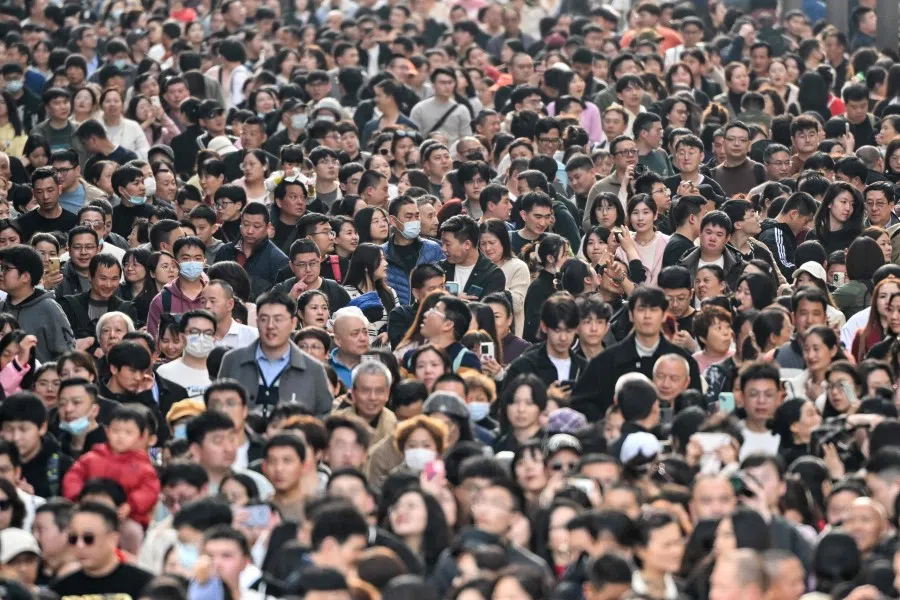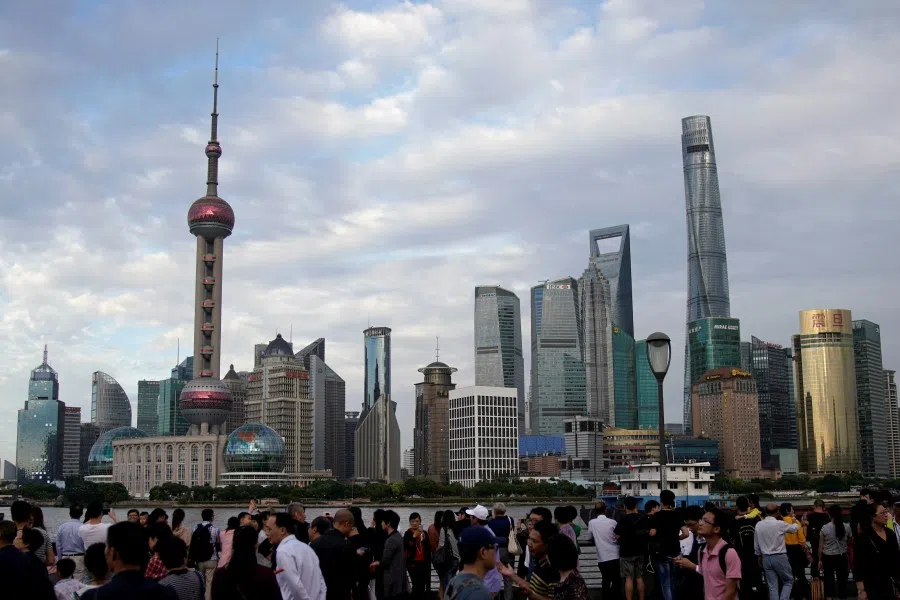China needs economic nationalism, not deeper globalisation
Academic Jianyong Yue notes that if China wants to truly be part of the global economy, and not a semi-periphery nation with outward-oriented, dependent development, practising economic nationalism to protect its industries and people is critical in this process. China can then achieve autonomous development under a strong state.

In May 2020, in response to the new Cold War, the Chinese government formally put forward the strategy of domestic circulation, highlighting that China's future economic development must mainly rely on its domestic market.
To dispel possible domestic and external doubts, the Chinese leadership clarified that domestic circulation was not the same as closing the nation off from the rest of the world; on the contrary, China would further open up. In other words, China's dual circulation strategy of domestic circulation and international circulation are not mutually exclusive, but go hand in hand and are mutually reinforcing.
Outward-looking strategy causing conflicts
The authorities are not insincere when they say that China is not closing itself to the world. China has been deeply integrated with the global economy for a long time, and is greatly dependent on the world for food, energy, raw materials, key components and equipment in manufacturing, and the import of technologies and patents. China can ill afford to pay the price for decoupling itself from the world, and closing itself to the world is objectively impossible even if it unilaterally wants to do so.
China's deep integration with the global economy is the combined result of its own choices and the strategies of the West following the 1989 Tiananmen Square incident. As a large and populous economy with relatively few resources, China's continued pursuit of a "deep globalisation" outward-looking strategy inevitably leads to global conflicts, making economic growth unsustainable. This was not anticipated by the Chinese and Western elites who "collaborated" to globalise China's economy at the turn of this century.
China's dependent development
It is undeniable that globalisation has led to China's miracle of export-led growth, especially after its accession to the WTO. However, globalisation is no free lunch as the WTO promotes growth but does not encourage development.
The essence of its three agreements (the Agreement on Trade-Related Investment Measures (TRIMs), the Agreement on Trade-Related Aspects of Intellectual Property Rights (TRIPS), and the General Agreement on Trade in Services (GATS)) is "protectionism (of technology) for the rich nations at the expense of the poor" (as assessed by Cambridge University's Professor Peter Nolan), with the objective of preventing latecomer economies from catching up and overtaking in the name of "non-discriminatory market access". This is even described as "anti-development" by another development economist from Cambridge University, Professor Ha-Joon Chang.
... even after 40 years of reform and opening up, China remains a semi-periphery nation with outward-oriented, dependent development.

Growth and development are different concepts. Development includes poverty alleviation, as well as catching up and overtaking, which means structural transformation from low to high-value production necessary for industrialisation. Growth does not automatically lead to catching up or overtaking. On the contrary, a disconnect may occur between growth and development, which can lead latecomer economies to the middle-income trap.
China's economy is the second largest in the world but its manufacturing sector is "large but not robust, comprehensive but mediocre", and it will take another 30 years to be a manufacturing power, which shows that even after 40 years of reform and opening up, China remains a semi-periphery nation with outward-oriented, dependent development. This growth trajectory is very different from that of the post-World War II East Asian developing nations with outward-oriented, autonomous development.
However, China's dependent development under the Chimerica framework that it is highly reliant on is not a reason for peace but a source of conflict, because China is massive and its "deep globalisation" approach has led to two severe global impacts.
First, the resultant global imbalance is of unprecedented scale. Second, international division of labour means that China has "no choice" but to resort to extensive industrialisation, which invariably leads to early depletion of its domestic resources. The global competition for non-renewable resources and the military expansion to safeguard the import of resources have strained China's relations with the West.
China-US conflicts result of super-globalisation
The failure of the US's (read: the West's) strategy to integrate China lies not only in its misjudgment of China's political development but also in its underestimation of the semi-peripheral China's infinite thirst for global resources. The structural conflict between China and the US is the result of the inherent logic of super-globalised "anti-development".
Such super-globalisation is neither a blessing for development nor helpful for the consolidation of democracy; it is a feast for capitalists from various countries who are "pursuing the maximisation of global profits". So far, globalisation has led to the widening of the wealth gap within almost all countries and between countries in the global north and south. In recent years, populism has risen around the world, Western democracy has deteriorated, and the world situation has remained unstable, all of which are closely related to this neoliberal globalisation that excessively weakens national sovereignty.
China, as a semi-peripheral country, cannot do without the world, but the converse is not true...
Since the beginning of this century, globalisation has been increasingly questioned. Developed countries were the first to reflect on it; this reflection became particularly profound after the global financial crisis from 2007 to 2009. However, globalisation continues to be popular in China, with both government and academia almost treating it as politically correct.

As a semi-peripheral country, China is extremely enthusiastic about free trade and globalisation, which is rare among countries. This is certainly not a natural result of China's successful modernisation but rather a form of dependent development. China, as a semi-peripheral country, cannot do without the world, but the converse is not true, as proven by the withdrawal of capital from China by various countries in recent years and the accelerated restructuring of the global industrial chain.
China needs to protect domestic market, invest in people
For China, the only way to solve its development problems (structural transformation) is economic rebalancing, which means shifting from an export-orientated and investment-driven economy to one that is consumption-led and innovation-driven: in other words, transforming dependent development to autonomous development.
Evidently, it is not possible to achieve domestic circulation with "600 million people earning 1,000 RMB a month". Boosting international circulation, which relies on maintaining export competitiveness by continuously depressing workers' incomes, will not help with economic transformation. Instead, it will only exacerbate the structural conflict between China and the West.
The key to rebalancing is to increase the incomes of China's middle and lower classes to boost consumption. However, increasing workers' incomes calls for enhancing labour skills and technological progress. This necessitates local enterprises, which bear the greatest responsibility for employment, to engage in long-term investment in human capital, otherwise they will be unable to offset the pressure of rising wage costs.
... domestic circulation must be about protecting the domestic market, and not unconditionally opening it up to the world.
As the foundation of China's autonomous development, the survival of local enterprises would determine China's modernisation. The inherent duty of a responsible government is to protect domestic industries from the threat of foreign competition; that is also the fundamental feature of modern capitalism, which seeks full employment and social stability. Therefore, domestic circulation must be about protecting the domestic market, and not unconditionally opening it up to the world.
China's policymakers have always focused on opening up to force reforms, but have intentionally or otherwise avoided unifying its domestic market. On this premise, decentralisation of power is certain to lead to the "balkanisation" of the economy, meaning market fragmentation. It will cause diseconomies of scale, resulting in huge wastage of investments and loss of efficiency (such as in photovoltaic and electric vehicles).
Developed countries first unify domestic markets
In contrast, developed nations start modernisation by unifying domestic markets. For instance, while the US practices federalism politically, the federal government regulates interstate economic activities. The golden age of industrialisation in the US occurred after the end of the Civil War, when the domestic market was unified.

The level of integration in the post-war Western European market even surpassed that of the US because the political elites of the European Community (the precursor to the European Union) recognised that only by achieving a high degree of internal market unity could European businesses possibly achieve economies of scale; otherwise, they would be fundamentally unable to compete with American businesses.
For latecomer economies, a unified domestic market is only meaningful if it is protected. The only prerequisite for removing market protection is that the domestic industries are developed and highly competitive globally.
In his seminal work The Political Economy of American Industrialization, American scholar Richard F. Bensel summarised three key experiences that led to the success of American industrialization: the gold standard, tariff protection, and a unified domestic market. Evidently, domestic market protection and market unification go hand in hand.
All of today's modernised powers (as represented by the US, Germany and Japan) have implemented industrial, trade and technology (ITT) policies as their economies were taking off. There is no reason why China should be an exception.
... domestic circulation driven by autonomous development invariably requires strengthening economic sovereignty.
According to the theory of modernisation, development cannot be achieved without a strong state, which has the responsibility to establish a strong domestic market, as well as to encourage the vibrancy and independence of domestic industries through industrial policies.
China needs a strong state
One stubborn issue in China's political system is that "orders do not leave Zhongnanhai", where decision-making is highly centralised in the central leadership. Under this administrative centralisation, delegating authority to local governments to implement industrial policies would only disrupt the unity of the national market.
It is clear by looking at developing nations that the key to a strong state lies in a strong central government, which means having specialised organisations within the central government that formulate and implement industrial policies in an integrated manner, like Japan's Ministry of International Trade and Industry.
In summary, domestic circulation driven by autonomous development invariably requires strengthening economic sovereignty. But what does greater international circulation mean in the current official narrative?

For a long time, Chinese authorities have used grandiose language to make "opening up" sound abstract and sacred, but they have never clearly explained what it really means (such as the pros and cons of WTO rules for China's development). This only confuses people (including those in power) and does not help shape a consensus conducive to China's reform and development.
The main purpose of the US in launching a trade war against China in 2018 was not to correct trade imbalance, but to destroy the Made In China 2025 initiative.
Expanding the external cycle is essentially abandoning economic sovereignty that is conducive to autonomous development, which goes against what the Chinese authorities repeatedly say about safeguarding the country's "development interests" (one of the three core national interests). For example, China and the US reached the phase one trade deal in January 2020, that strictly prohibits compulsory technology transfer, sets up a highly-binding dispute resolution mechanism, and provides for burden-shifting in IP disputes (Article 1.5).
Trade war meant to hit at Made in China 2025
These provisions are a break with the existing WTO rules on "forced technology transfer", which has hitherto been an economic right that the TRIMs agreement allows member states to legitimately retain. The provision for burden-shifting where the burden of proof in IP disputes falls to the accused runs contrary to the international legal principle of presumption of innocence, and puts China in a passive position.
The US's disdain for multilateral principles and its use of bilateral negotiations (which are essentially unilateral pressure tactics) to resolve economic and trade disputes have even prompted protests from the WTO. However, since December 2017, Europe, the US and Japan - at the expense of China sacrificing significant "development interests" - have proposed the "Trilateral Reform Proposal" to the WTO, attempting to incorporate "prohibition of forced technology transfer" and "burden-shifting" into the WTO rules system and impose them on the Third World.
The main purpose of the US in launching a trade war against China in 2018 was not to correct trade imbalance, but to destroy the Made In China 2025 initiative.
The US has admitted that it is an instinctive response aligned to its realist raison d'état (reason of state), in the context of the rapidly narrowing China-US power gap. The new Cold War has a dual purpose: to suppress China's emergence, and to go after the huge Chinese market. Decoupling is a means and not an end.
American think tank scholar Michael Pillsbury, who has a close relationship with Trump, declared that Trump hopes that China's entire opening-up policy will be like the Shanghai Free Trade Zone, that is, unconditionally open to the US; former national security adviser Herbert McMaster even suggested that it might be necessary to consider kicking China out of the WTO to compel China to return to reform and opening up.
So what would it look like to the US for China to "return to its policy of reform and opening up"?

In April 2023, US scholar Adam Tooze wrote in Foreign Policy that "America Has Dictated Its Economic Peace Terms to China", which in layperson's terms means the total compradorisation of China. The confidence of the US is not without reason. A famous American scholar cited an internal speech by a former Chinese economic leader who reassured senior officials, saying the Chinese Communist Party is not worried about following in the footsteps of the collapse of the Soviet Communist Party because "we have the support of Morgan Stanley and Wall Street".
Economic nationalism is critical in this process. Blindly advocating market fundamentalism while vilifying economic nationalism not only shows ignorance of history, but is a travesty against knowledge.
Economic nationalism necessary
The obsession with free trade and globalisation is a recipe for failure for latecomer economies. However, despite "deep globalisation" having resulted in China's dependent development, the general consensus among China's political and intellectual elites seems to be that "deeper" globalisation is the way out of the middle-income trap.
I have said in a previous article that neither a closed-door policy or dependent development is the way to a strong and prosperous country. The Chinese authorities definitely did not propose domestic circulation because they wanted it, but due to circumstances, and has nothing to do with the closed-door approach.
However, ignoring the realities of China's development as a semi-periphery nation while emphasising dual circulation will backfire, because at the current stage of China's development, the two will nullify each other and are incompatible. This has already been sufficiently proven in theory and practice, as well as China's development trajectory. The real crux of the matter, therefore, is whether domestic circulation should move towards autonomous development or continue with dependent development.
Rebalancing the economy is an integral requirement for China to move towards autonomous development, which needs a strong state; that is not synonymous with an autocracy, and all of today's industrial democracies are strong states. The US has spared no effort in defending its sovereignty, and its protection of its industries is worthy of China's emulation.
For latecomer economies around the world, there is unique importance in having democratic development first. Only by establishing democracy and the rule of law can the systemic foundations of crony capitalism be shattered, so as to establish a strong footing for domestic demand.
Economic nationalism is critical in this process. Blindly advocating market fundamentalism while vilifying economic nationalism not only shows ignorance of history, but is a travesty against knowledge. The key to solving China's development problems is having democracy in politics and nationalism in the economy.
In short, the priority for the policymakers in considering the future of the semi-periphery nation called China seems to be to dispel the myths of globalisation, to emulate the US, and autonomous development.
This article was first published in Lianhe Zaobao as "内循环:自主发展,还是依附发展?".



![[Video] George Yeo: America’s deep pain — and why China won’t colonise](https://cassette.sphdigital.com.sg/image/thinkchina/15083e45d96c12390bdea6af2daf19fd9fcd875aa44a0f92796f34e3dad561cc)
![[Big read] When the Arctic opens, what happens to Singapore?](https://cassette.sphdigital.com.sg/image/thinkchina/da65edebca34645c711c55e83e9877109b3c53847ebb1305573974651df1d13a)
